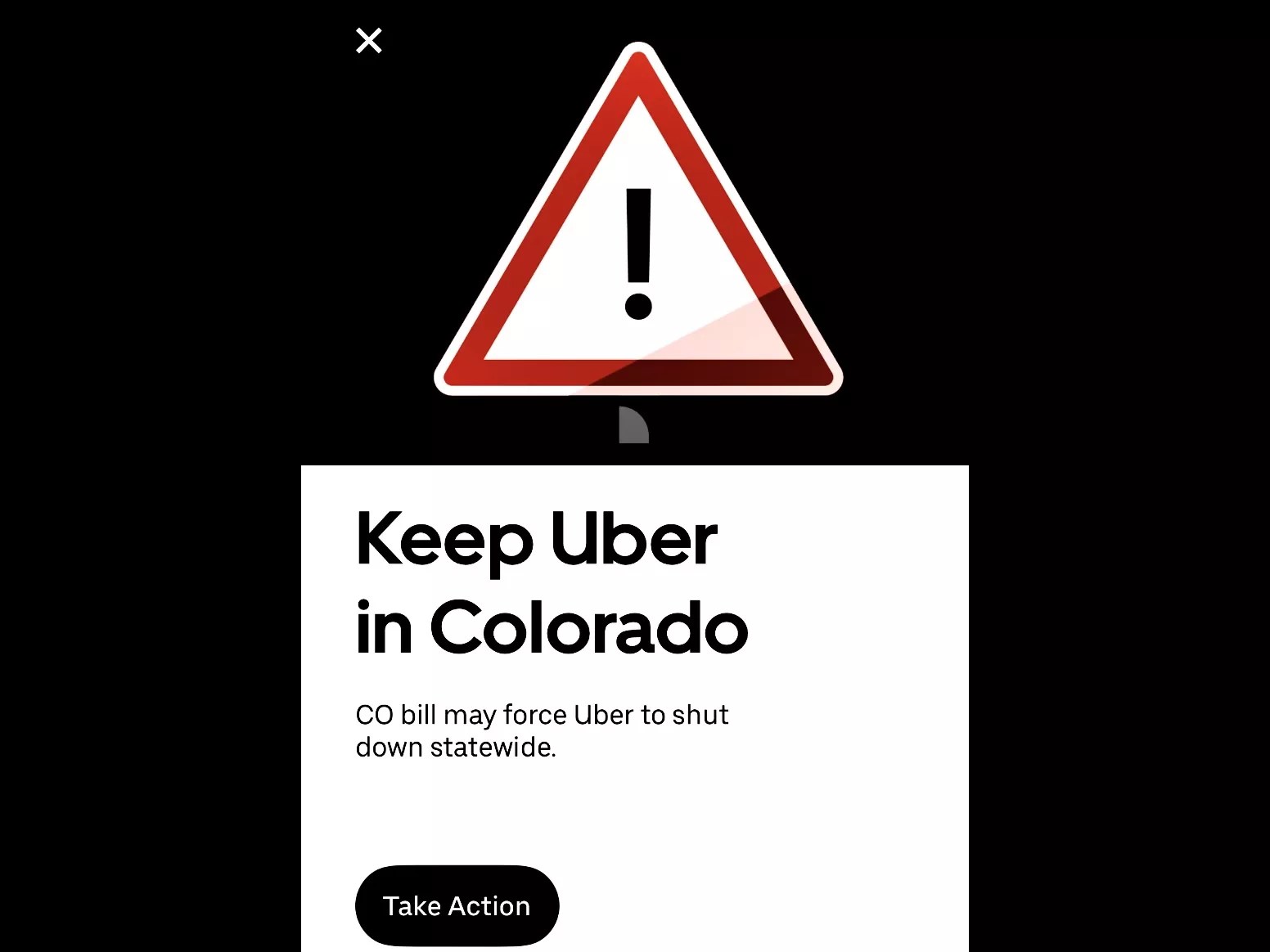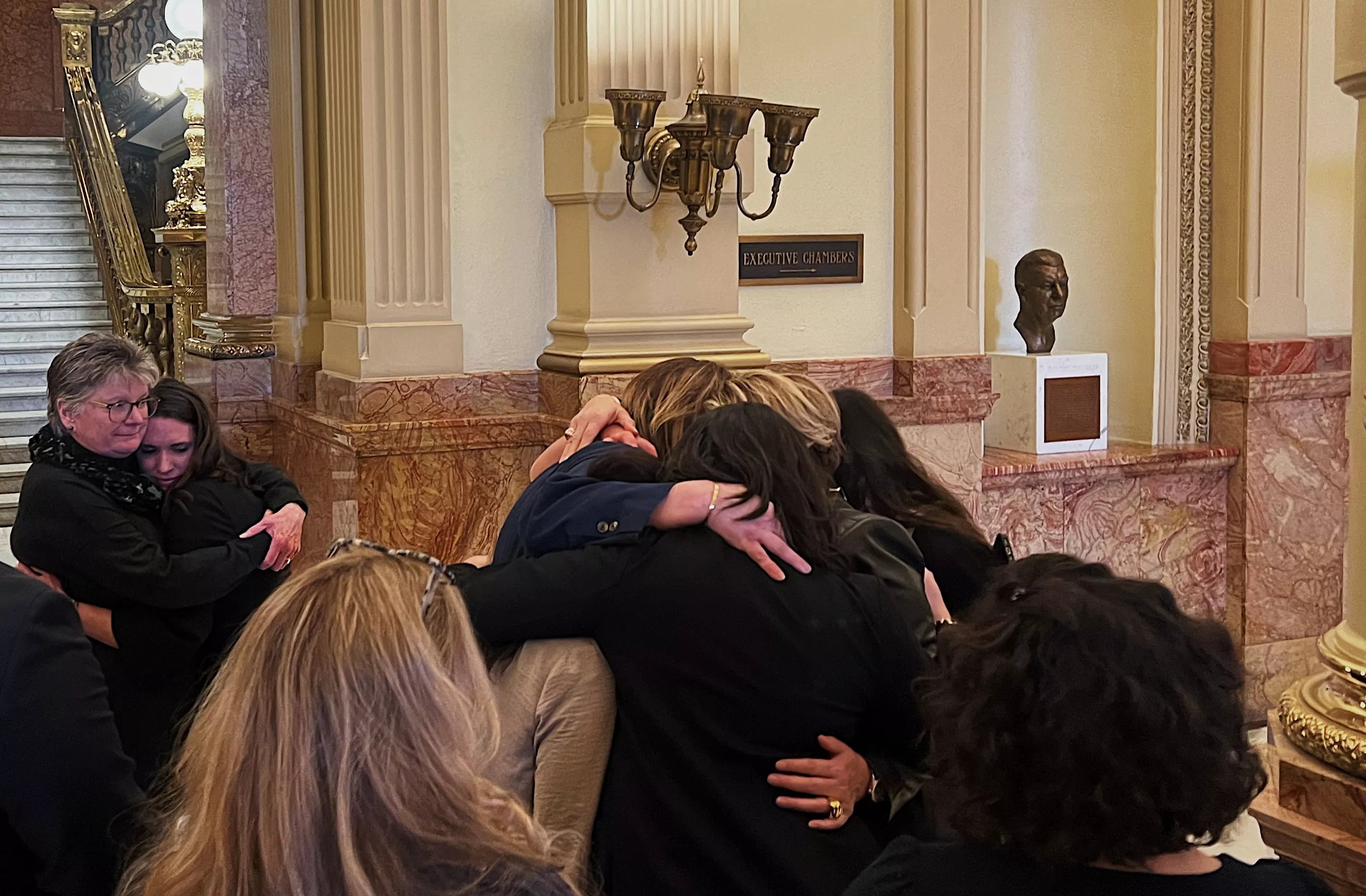
Uber

Audio By Carbonatix
There were more than 19,000 reported sexual assault incidents during Uber and Lyft rides between 2017 and 2022, according to the companies’ safety reports.
Colorado Representative Jenny Willford joined those thousands of victims in February 2024, when she says her Lyft driver sexually assaulted her outside of her Adams County home. When Willford reported her assault to Lyft, she says the company merely issued a refund. When she went to law enforcement, she was met with Colorado’s massive backlog of rape kits, forcing her to wait around 554 days for her kit to be processed before she can begin pursuing criminal charges.
With no avenue for justice in sight, Willford turned to her legislative colleagues in hopes of preventing such a traumatic event from happening to other Coloradans.
They came up with House Bill 25-1291, a proposed state law intended to strengthen safety requirements for rideshare companies. The measure would require background checks for drivers every six months, establish policies to crackdown on unauthorized driver account sharing, and speed up the timeline for companies to respond to law enforcement investigations and user reports of assault.
“One sexual assault is one too many, but 15,000 is a crisis,” Willford said on the House floor on Wednesday, May 7, directing a message to rideshare companies: “We are done making you comfortable. We are done letting you bully and silence survivors.”
Legislators passed the bill on Wednesday, with eighty out of 100 voting in support. Now it only needs approval from Governor Jared Polis to become law.
However, the governor is still weighing the bill’s fate.
“[Polis] has shared concerns about privacy, conflicts with federal and existing state law, and the ability of the bill to be successfully implemented and the ability for TNCs to successfully comply,” says Eric Maruyama, the governor’s spokesperson. “He will review the final version of the bill.”
Legislators fear Polis may veto the policy. The millionaire-tech-entrepreneur-turned-governor repeatedly killed efforts to regulate technology companies this session. Polis vetoed a bill in April that would have required social media companies to remove accounts using the platforms to sell drugs, guns or sexually exploit minors, arguing that it stifled free speech and violated user privacy. Earlier that month, legislators tabled a bill to require age verification to access online pornography because of similar free speech-related objections from Polis.
Sponsors of HB 25-1291 gave passionate pleas on the House and Senate floors Wednesday, imploring Polis to sign the bill into law.
“Governor, I beg you. Stand with survivors, not just in word, but in law. Sign this bill,” Willford said. “Being so wedded to the opinion of a technology company that you use industry talking points against the very survivors who are begging you to see them…who are screaming at the top of their lungs, begging you to hear us and believe us. Governor, this is why survivors don’t come forward.”

Representative Jenny Willford embraces her legislative colleagues after sharing her sexual assault story during a press conference on Tuesday, January 14, 2025.
Hannah Metzger
The governor’s hesitancy toward the rideshare safety bill comes as Uber has publicly threatened to cease operations in Colorado if Polis signs the bill into law.
Uber spokesperson Gabriela Condarco-Quesada says the company “urges” Polis to veto the policy, calling it “a bill developed behind closed doors and driven by the financial interests of billboard attorneys – not the needs of Coloradans.”
“If enacted, this legislation would force Uber to shut down operations, stripping thousands of drivers of flexible earning opportunities and cutting off a trusted, reliable transportation option for hundreds of thousands of riders,” Condarco-Quesada says.
It’s a familiar ultimatum. Uber has threatened to leave numerous cities, states and even entire countries when governments pass regulations the company disagrees with. Uber has rarely followed through on its promised exits, but the threat itself is often enough to force concessions from politicians.
Uber initially objected to portions of HB 25-1291 that would have required all rides be recorded and prohibited drivers from giving passengers food or water, calling the former a “technical and financial burden” and saying the latter would open the company up to excessive lawsuits if drivers disobey. In response, legislators amended the bill to only require recordings if both a driver and passenger opt in, and to only allow civil suits if an incident results in death, sexual assault, kidnapping or personal injury.
The bill would also ban individuals from being drivers if they have been convicted of assault, harassment, kidnapping, menacing, domestic violence, impersonating a driver or sharing a driver account. In addition, it would require rideshare companies to review drivers accused of such misconduct within seven days and respond to law enforcement requests within two days.
Those changes were not enough to get the rideshare companies on board with the bill. Although Lyft is not threatening to pull out of Colorado like Uber, they’re still unhappy with the policy.
“While safety on our platform is paramount, the bill that passed fails to address fundamental flaws in the original version and, in crucial ways, made the legislation worse,” says Lyft spokesperson CJ Macklin. “Multiple provisions were added last-minute without consideration for the long-term consequences they could impose upon both riders and drivers. There are better ways to improve safety in Colorado, and we remain committed to working toward a more productive solution.”
Macklin did not answer a follow-up inquiry about which new aspects of the bill Lyft takes issue with.
Supporters of the policy argue that the companies are putting their bottom lines above the safety of passengers and drivers. Uber, in particular, has rallied hard against the bill, even adding a pop-up message to its app, telling Colorado customers that a “CO bill may force Uber to shut down statewide” and directing them to “take action” by asking their legislators to oppose the policy.
“I have to wonder if this bill would have been even necessary if the rideshare companies put this level of resources into safety as they have in trying to kill this bill,” Willford said on the House floor Wednesday. “Where were they when they could have saved survivors? Instead of continuing our good faith negotiations and conversations, they created a false ultimatum, a hostage situation.”
Maruyama, the governor’s spokesperson, says Polis “is committed to making Colorado safer for everyone, including making sure ride-sharing companies are keeping riders and drivers safe.”
The bill sponsors question how vetoing the bill aligns with the governor’s stated safety goal. Senator Faith Winter specifically pondered why rideshare technology companies would be held to different safety standards than other transportation systems: “If thousands of people were being raped and assaulted on airplanes, we would absolutely do something,” she said Wednesday. “So why wouldn’t we do something right now?”
“We know one assault is one too many,” Representative Meg Froelich added during the hearing. “How many is enough to make change?”
Polis has until June 6 to sign, veto or let the bill become law.